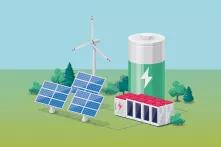In late 2019, the European Green Deal was presented with pomp and circumstance, garnering widespread support. Just over four years later, as the current EU political cycle comes to an end, this support is withering. The European Commission has shelved parts of the Deal, scrapping proposals to halve the use of pesticides, for example. In the EU Council, the Nature Restoration Law hangs in the balance. And in the European Parliament, the conservatives have worked to reduce the ambition of the Green Deal, while the liberals have called for a “regulatory pause”. Meanwhile, the social democrats are campaigning to put the social dimension front and centre.

In response to the concerns around competitiveness and social costs driving criticism of the Green Deal, European leaders intend to call for a new “European Competitiveness Deal” at next week’s European Council summit, while the business sector is pushing for an “European Industrial Deal”. Both claim to complement the European Green Deal, but in fact they carry the seeds to undermine it. Not a full-frontal attack; rather an indirect approach to dislocate it. The inherent message: we’ve had enough green, now it’s back to business as usual.
This approach would be a grave mistake. The European Green Deal is inherently a business case, a “strategy for growth”, in the words of European Commission President Ursula von der Leyen. The global race for green tech and economic prosperity is intensifying, with Europe at risk of losing out. The EU is stuck between the US Inflation Reduction Act – the largest investment in green industry and economic growth in the country’s history – and Chinese dumping of subsidised green tech products, such as electric cars, solar panels, and wind turbines, on the European market. Answers to this challenge need to be found. A return to the false dichotomy of green versus business should not be among them.
Instead of supplanting the European Green Deal with “competitiveness” or “industrial” deals, the EU should work to strengthen the industrial aspects of the package, adapting the overall business environment (capital markets, regulatory framework, R&D, etc.) to support its aims and guiding its evolution into a European Green Industrial Deal. This seems to be the approach favoured by the economy ministers of France, Germany, and Italy, who have called on the EU to “foster the development of green and digital technologies to enhance European competitiveness and productivity” during the 2024-2029 institutional cycle. And this is how Greens should approach this debate and fill it with life. In spite of vocal anti-green opposition, it is also what many citizens are looking for. Polling data is clear: A majority of voters want ambitious climate policies that ensure economic momentum and are socially manageable, particularly when these policies are combined with other priorities, such as economic security.
At the Heinrich-Böll-Stiftung European Union, our contribution to this debate is a 100% Renewable Energy Action Plan for the next European Commission. Developed together with Environmental Action Germany (Deutsche Umwelthilfe), the Action Plan puts forward policy proposals on how to accelerate the deployment of renewables to advance economic prosperity. Together with the EU DisinfoLab, we have also launched the Climate Clarity Hub, a dedicated platform that brings together knowledge and expertise on climate disinformation – more important than ever in the run up to 6-9 June 2024. And on the subject of the elections, our European Parliament elections dossier now features an interview with Timothy Garton Ash on the EU and the war in Ukraine. Listen also to my conversation on post-EU elections scenarios with Sophie Pornschlegel (Europe Jacques Delors), in our latest Böll·Europe Podcast episode. As always, further details can be found in our newsletter.
Warm regards,
Roderick Kefferpütz, Director, Heinrich-Böll-Stiftung European Union


